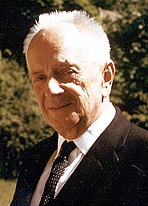Industrial civilization, aided by science, has helped most of us to healthier, longer and better lives but in the process of change, something was lost. We have lost the certitude that humans stand at the center of a universe created especially for us. We have lost the conviction “that this uni-verse is presided over by a Power that can be implored or propitiated and which cares for man, individually and collectively.”
Copernicus and Galileo showed that the world does not revolve around man. To many Darwin seemed to complete the destruction of human uniqueness. In the evolutionary world-view, humans are merely one of some two million biological species, a relative of monkeys and apes. Then Freud mocked man’s pretensions to spirit-uality, by denying him not only spirituality but rationality as well.
But humans have not only evolved, they are evolving. They may not be the center of the universe physically, but they may become the spiritual center.
Dobzensky accepts Teilhard de Chardin’s vision of humanity as the ascending arrow of a great biological synthesis that would produce “a harmonized collectivity of consciousnesses, equivalent to a kind of superconsciousness.” That development would give coherence to the history of the whole universe.


